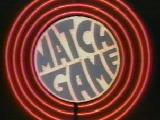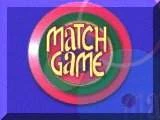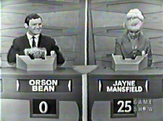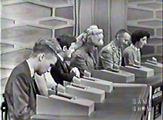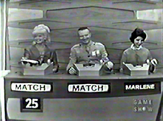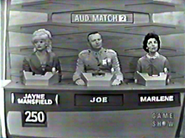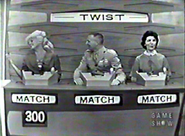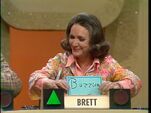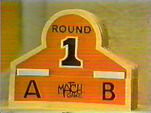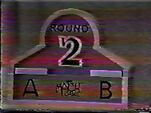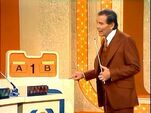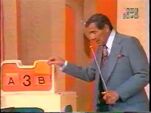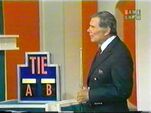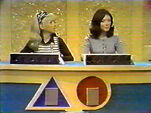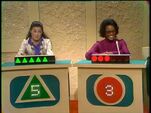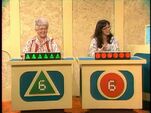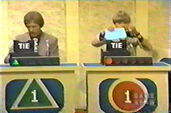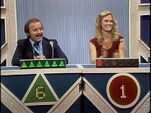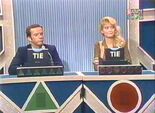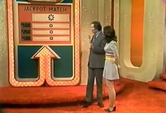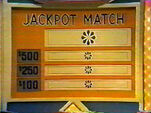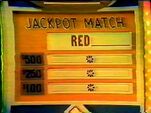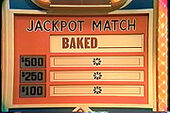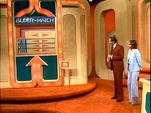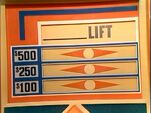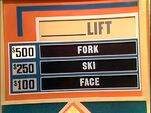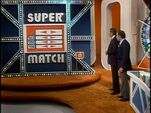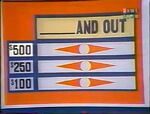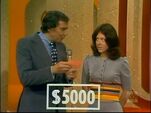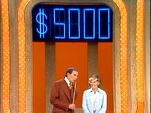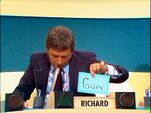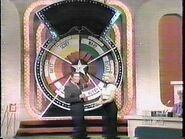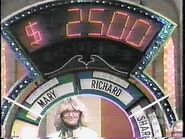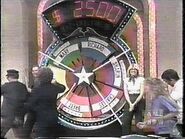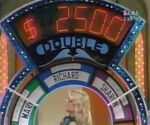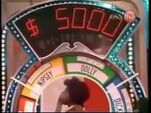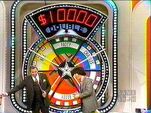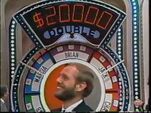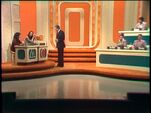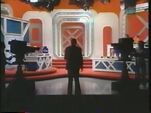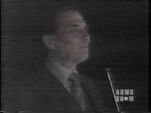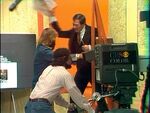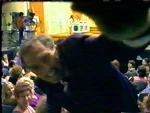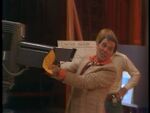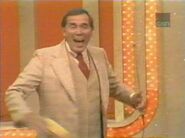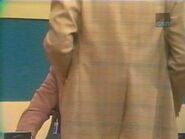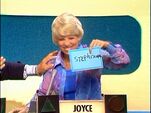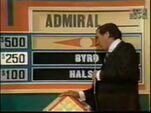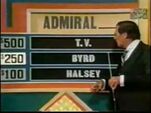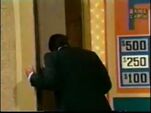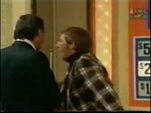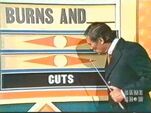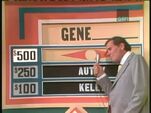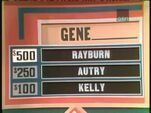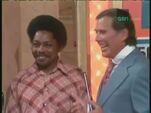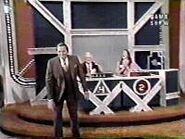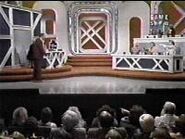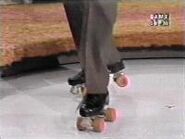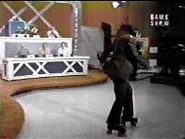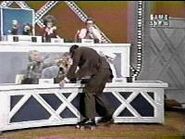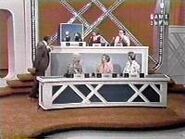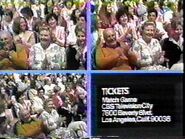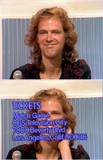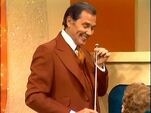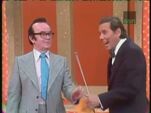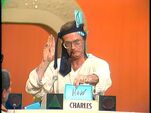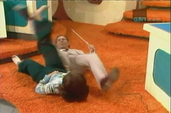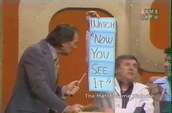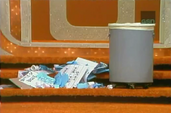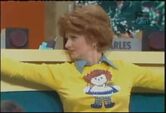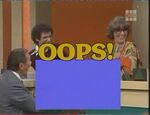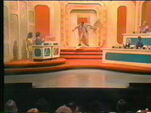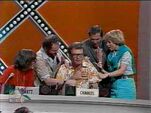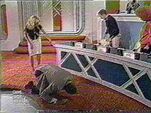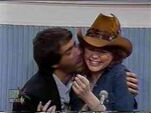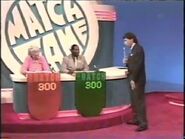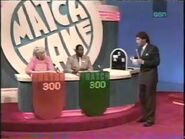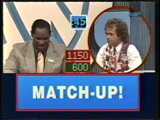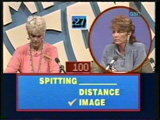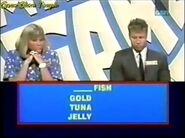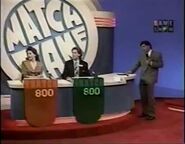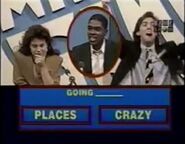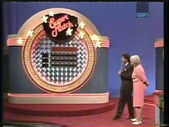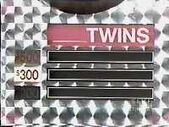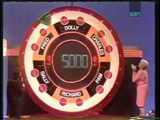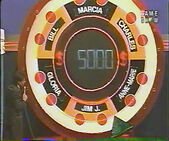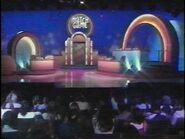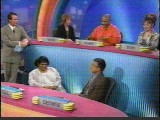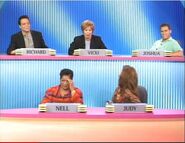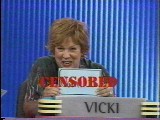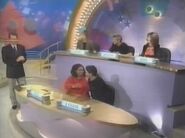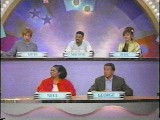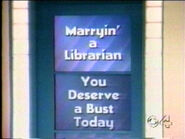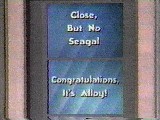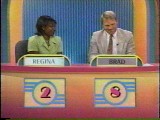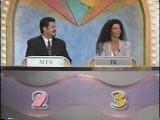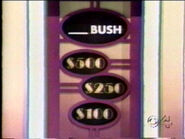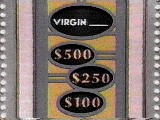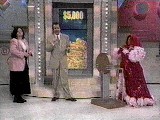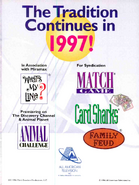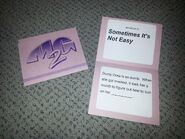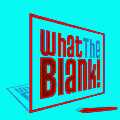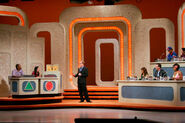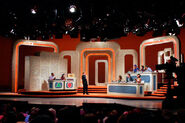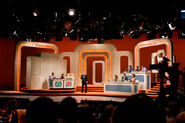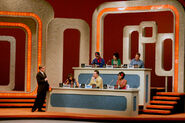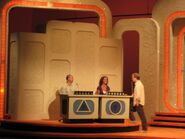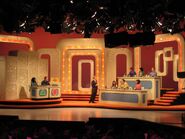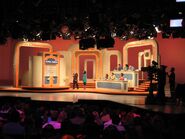| Hosts | |
|
Gene Rayburn (1962-82) | |
| Announcers | |
|
Johnny Olson (1962-82) | |
| Broadcast | |
| Pilot: 12/5/1962 NBC: 12/31/1962 - 9/26/1969 Pilots: 5/19/1973 CBS "Match Game 7X": 6/25/1973 - 4/20/1979 Syndicated (Weekly): 9/8/1975 - 9/13/1981 Syndicated (Daily): 9/10/1979 - 9/10/1982 Pilots: 10/1/1989 ABC: 7/16/1990 - 7/12/1991 Pilot (MG2): 1996Syndicated (Daily): 9/21/1998 - 5/21/1999 CBS (Gameshow Marathon): 6/22/2006 Pilot: 7/22/2008 | |
| Packagers | |
| Mark Goodson-Bill Todman Productions (1962-82) Mark Goodson Productions (1989-91) Pearson Television (1998-99) Granada (2006) | |
| Distributors | |
| Jim Victory Television (1975-1982) Pearson Television (1998-1999) Fremantlemedia North America (2006-2008) | |
1962 Pilot Opening Spiel: From New York City, NBC-TV presents THE MATCH GAME! (Snap!) This portion brought to you today by the makers of new decongestant Bromo Quinine, the medication that gives you fast, effective big relief for big cold miseries. And now, here's your host, Gene Rayburn!
60s Opening Spiel: From New York City, NBC-TV presents/it's time to play THE MATCH GAME! This portion of The Match Game is brought to you today by...(insert sponsor tag) And now, here's your host/With the star of Match Game, Gene Rayburn!
1973 Opening Spiel (both pilots): Get ready to match the stars... Arlene Francis, Jack Klugman, Bert Convy, Jo Ann Pflug, Richard Dawson, Betty White, as we play the 1973 edition of MATCH GAME! And (now) here's the host of Match Game, GENE RAYBURN!!!
70s/90s Opening Spiel: Get ready to match the stars... (insert celebrities' names) as we play the (all new) star-studded (big money) Match Game (7?/PM)! And now, here's the host/star of Match Game (7?/PM), GENE RAYBURN/ROSS SHAFER!!!
1989 Pilot Opening Spiel: Get ready to match the stars... Brad Garrett, From Night Court Marsha Warfield, Charles Nelson Reilly, From The Head of The Class Khrystyne Haje, From Coach Jerry Van Dyke, and Teri Copley. as we play the all-new, star-studded MATCH GAME! And here's the star of Match Game, BERT CONVY!!!
1998-99 Opening Spiel (1): Wanna have the most fun you've ever had watching a game show? (Audience: "YEAH!") All you need is a set... Wonderful stars like... (insert celebrities) Two great contestants, like... (insert contestants) And the guy that makes it all happen, our host, MICHAEL BURGER! All here on MATCH GAME!
1998-99 Opening Spiel (2): Looking for the most fun you've ever had watching a game show? (Audience: "YEAH!") Well COME ON IN! We've got five wonderful stars... (insert celebrities) And two great contestants... (insert contestants) And the guy that makes it all happen, our host, MICHAEL BURGER! All here on MATCH GAME!
2006 Gameshow Marathon episode Opening Spiel: Get ready to match the stars... George Foreman, Kathy Griffin, Bruce Vilanch, Adrianne Curry, Adam Carolla, and Betty White. as we play the star-studded, big money MATCH GAME! And now, here's your host RICKI LAKE!!!
2008 Pilot Opening Spiel: Get ready to match the stars... Super Dave Osborne, Sarah Silverman, Scott Thompson, Rashida Jones, Norm Macdonald, and Niecy Nash. as we play the star-studded, big money MATCH GAME! And here's the star of Match Game, ANDY DALY!!!
The long-running game show where celebrities match contestants and vice versa, simply by filling in the blanks. If the contestants do it very well, they win lots of money.
Rules for the NBC Versions
Two teams of three players (consisting of two civilian contestants & one celebrity team captain), competed in this early version which was a game of judgment. Host Rayburn read a question in which the possibilities are endless, plus they were not restricted to fill-in-the-blank types. All six players wrote down their answers on their cards and raised their hands to indicate that they were done. Each player revealed their answers one player at a time, and their objective was to match their teammates. For each match the team made, they scored $25. If no match was made whatsoever, Gene reread the question, and the players rewrote their answers (they can be the same or can be different). The first team to reach $100 (make four matches) won the game, and went on to play the Audience Match.
Audience Match
In the Audience Match, the winning team attempted to match members of the previous studio audience. Host Rayburn asked three questions, and on each question, the team gave individual verbal answers that they think was the number one answer (they can agree or disagree on each other's answers). The contestants divide $50 for each player on the team they did give the #1 answer for a maximum of $150, so with three questions, they can win up to $450.
Pilot
The pilot was exactly the same as the series except that the scoring format was different. In the main game, each match was worth 10 points with 50 needed to win. The contestants on the winning team split $100. Each match made in the Audience Match was worth $25 for maximum of $75 on each question. Four questions were asked, so the maximum total was $300.
Rules for the CBS & 70's Syndicated Versions
Gene Rayburn greets two contestants and several million Americans on Match Game '7?/PM. Two contestants, including a returning champion, competed. The champion was seated in the upstage (red circle) seat and the opponent was seated in the downstage (green triangle) seat. On Match Game PM and the daily syndicated version, a coin toss was held backstage to determine the positions. The object was to match the answers of as many of the six celebrity panelists as possible on fill-in-the-blank statements.
The main game was played in two rounds. The opponent was given a choice of two statements labeled either "A" or "B". Rayburn then read the statement. While the contestant pondered an answer, the six celebrities wrote their answers on index cards. After they finished, the contestant was polled for an answer. Gene then asked each celebrity — one at a time, beginning with #1 in the upper left hand corner — to respond.
While early questions were similar to the NBC version (e.g., "Name a type of muffin" and "Every morning, John puts _________ on his cereal"), the questions quickly became more humorous. Comedy writer Dick DeBartolo, who had participated in the 1960s Match Game, now contributed broader and saucier questions for Gene. Frequently, the statements were written with bawdy, double entendre answers in mind. A classic example: "Did you catch a glimpse of that girl on the corner? She has the world's biggest _________."
Frequently, the audience responded appropriately as Gene critiqued the contestant's answer (for the "world's biggest" question, he might show disdain to an answer such as "fingers" or "bag", and compliment an answer such as "rear end" or "boobs", often also commenting on the audience's approving or disapproving response). The audience usually would groan or boo when a contestant gave a bad answer, whereas they would cheer and applaud in approval of a good answer. There were a handful of potential answers that were prohibited, the most notable being any synonym for genitalia.
The contestant earned one point for each celebrity who wrote down the same answer (or reasonably similar as determined by the judges; for example, "rear end" could be matched by "bottom", "behind", "derrière", "fannie", "hiney", etc.) up to a maximum of six points for matching everyone. After play was completed on one contestant's question, Gene read the statement on the other card for the opponent and play was identical.
Popular questions featured "Dumb Dora" or her male counterpart, "Dumb Donald". These questions would often begin, "Dumb Dora/Donald is/was so dumb..." or "Dumb Dora/Donald is/was REALLY dumb." To this, the audience would respond en masse, "How dumb IS/WAS he/she?" Then Gene would finish the question. Other common subjects of questions were Superman/Lois Lane, King Kong/Fay Wray, panelists on the show (most commonly Brett Somers), politicians, and Howard Cosell. Gene always played the action for laughs, and he frequently tried to read certain questions in character; for example, he would recite questions involving a made-up character named "Old Man Periwinkle", or "102-year-old Mr. Periwinkle", in a weak, quavering voice (he also did Periwinkle's female counterpart, "Old Mrs. Pervis"). Charles Nelson Reilly, who admitted in '77 he was Brett Somers's rival (as they often argued), one of the regular panelists and one who was often involved with directing Broadway plays, would often make remarks regarding Gene's acting such as "I like when you act" and "That was mediocre" when Gene did a voice like this; this tended to draw a big laugh from the audiences. At times, questions would deal with the fictitious (and often sleazy) country of "Nerdo Crombezia".
On Match Game PM and the daily syndicated version whichever player was ahead in points after Round 1 always began by choosing a question first in Round 2. This rule ensured that both players would be able to play two meaningful questions. (Without this rule, a player who had only answered one question could be ahead of another player who had played both his/her questions, rendering the final question moot.) Only celebrities that a contestant did not match could play this second round. On the CBS version, challengers always chose a question first in the next round.
The second round questions were generally easier and were usually puns that had a "definitive" answer (for instance, "Did you hear about the new religious group of dentists? They call themselves the Holy _____.", where the definitive answer would be "Molars"), whereas the first round usually had a number of possible answers. This was to help trailing contestants pick up points quickly.
On Match Game PM, a third round was added after Season One as the games proved to be too short to fill the half-hour. Again, the only celebrities who played were those who did not match that contestant in previous rounds.
The player who matched more celebrities at the end of the game is declared the winner. If the players had the same score at the end of "regulation", the scores were reset to 0-0. On PM (or on the syndicated daytime show if time was running short), a time-saving variant of the tie-breaker was used that reversed the game play. The contestants would write their answers first on a card in secret, then the celebrities were canvassed to give their answers. The first celebrity response to match a contestant's answer gave that contestant the victory; if there was still no match (which was rare), the round was replayed with a new question. On the CBS version, the tie-breaker went on until there was a clear winner. If it came to the sudden-death tie-breaker, only the final question (the one that ultimately broke the tie) was kept and aired.
The CBS daytime version had returning champions and the show "straddled" – that is, episodes often began and ended with games in progress.
On the CBS daytime show, champions could stay until defeated or reached the network's limit of $25,000. Originally, that was the maximum earning for any champion, but the rule was later changed so that while champions were still retired after exceeding the $25,000 limit, they got to keep everything up to $35,000. During the six-year run of Match Game on CBS, only one champion retired undefeated.
On the daily 1979-82 syndicated version, two contestants would play two games against each other, and then both were retired. The show was timed out so that two new contestants appeared each Monday; this was necessary as the tapes of the show were shipped between stations, and weeks could not be aired in any discernible order (a common syndication practice at the time, known as "bicycling"). If a Friday show ran short, audience members sometimes got to play the game; this occurred on only three occasions.
Episodes of Match Game PM were self-contained, with two new contestants each week.
Question Podium
Super Match
The winner of the game went on to play the (Big Money) Super Match, which consisted of the Audience Match and the Head-To-Head Match segments, for additional money. On the CBS version, the winner of the game won $100.
The Super Match was referred to as the "Jackpot Match" in the 70s pilot.
Audience Match
A two to four word fill-in-the-blank phrase was given, and it was up to the contestant to choose the most common response based on a studio audience survey. After consulting with three celebrities on the panel for help, the contestant chose an answer they liked the best, or chose one of their own that they thought of themselves. The answers were then revealed; the most popular answer in the survey was worth $500, the second-most popular $250, and the third-most popular $100. If a contestant failed to match any of the three answers, the bonus round ended. Two Audience Matches were played on Match Game PM. On at least one occasion on Match Game PM, a contestant failed to win any money on either Audience Match; the contestant then got to play a fill-in-the-blank statement with the entire panel for $100 per match ($600 in total) as a consolation prize, or a possible $200 per match when the Star Wheel was instituted. This has rarely occurred.
Head-To-Head Match
The contestant then had the opportunity to win an additional cash prize equal to 10 times what he or she won in the Audience Match (therefore, $5,000, $2,500 or $1,000) by matching another fill-in-the-blank response with a celebrity panelist of his or her choice. In order to win the money, the contestant had to match his or her chosen celebrity's response exactly; this meant that multiple forms of the same word, e.g. singular or plural, were usually accepted whereas synonyms were not. If successful, he/she won the extra money (the total prize being $1,100/$2,750/$5,500). Thus, a maximum of $5,600 ($100 won for winning the game) could be won on the daytime version per game & Super Match ($10,600 when the Star Wheel was instituted). On Match Game PM, a maximum of $11,000 could be won ($21,000 when the Star Wheel was instituted). The latter has occurred at least twice.
Richard Dawson was the most frequently-chosen celebrity in the 1970s version. His knack for matching contestants was so great that producers tried to discourage contestants from repeatedly choosing him, even before the introduction of the Star Wheel; in 1975 a rule was added, stipulating that a returning champion could not choose the same celebrity again for the Head-To-Head Match—this only lasted six weeks.
Star Wheel
The "Star Wheel" was introduced in 1978 and was used until the syndicated version ended in 1982. Contestants spun the wheel to determine which celebrity they played with in the Head-To-Head Match, and could double their potential winnings if the wheel landed on an area of gold stars under each celebrity's name (later changed to three individual stars per celebrity to increase the difficulty of obtaining a double).
The wheel was added to prevent people from constantly choosing Richard Dawson, although the first time it was used it landed on Richard nonetheless. This caused the rest of the panel to get up and leave, leading fellow star Charles Nelson Reilly to refer to it on that episode as "the famed and fixed Star Wheel". Also, Mary Wickes blurted out, "Do you know what that wheel cost us? And it's right back to Richard!"
| This page uses Creative Commons Licensed content from Wikipedia (view authors). |
The Set
Wacky Moments
This show is also known for its whack job moments, and here are a few of them.
Gene Attacks
Several times throughout the course of the series, Gene would playfully attack some members of the crew. One time, when he was attacking the camera, it hit him on the head!
School Riot
In one episode from 1977, a real out-of-control moment occurred. First of all, one of the rules in the game was that specifics cannot match generics unless otherwise noted; what happened was that some answers were not accepted and it caused a real ruckus. The question in question: "Dumb Dora is so dumb ("HOW DUMB IS SHE?!") she sent her cultured pearls to BLANK." The answer given by the contestant, whose name was Craig, was "School". He managed to match the top tier despite a minor setback involving Charles Nelson Reilly, whose answer was "Scuba Diving School"; the judge buzzed Charles’ answer, but Charles protested and the judge was forced to give the contestant the match. The other answers given by the top tier (Ed Asner & Brett Somers) were the same, "College", but here's where everything went south: Debralee Scott & Richard Dawson each said "Finishing School", but again the judge said no, only this time he did not reverse his decision (Debralee's answer was originally accepted, but was quickly buzzed). This really riled up Debralee & Richard, who then started (you guessed it) a riot. Gene tried everything to regain control but to no avail. With the riot still active, Gene went to Patti Deutsch, the last in line; Patti was super nervous in showing her answer, but she eventually did. Her answer was "Night School"; as Patti feared, it got buzzed, making the riot and the booing larger. When the show came back from a break, Charles was lying on the steps just to reenact the aftermath of the now infamous "School Riot" with Brett showing multiple cards (like she occasionally does) to identify the action. Debralee & Richard never took their cards down. Luckily, even though he lost the game 4-3, Craig was invited back to play in a future game. Here are the pictures of the infamous activity:
Rotten Spelling
On the premiere of Match Game PM, Joyce Bulifant (even though she matched) mispelled a word; in this case it was the word "stethoscope". Any die-hard Match Game fan knows that spelling does not count whatsoever.
Slide it, Earl!
There are even hilarious moments during the Super Match, mostly involving Audience Match board operator Earl.
Star Wheel Premiere, Not too Glorious
On the day of the premiere of the then-new Star Wheel, the winning contestant just picked up $250 from the Audience Match and became the first person to spin this new wheel. Supposedly it would give the contestant a chance to match anybody else but Richard Dawson, but guess who the wheel landed on?
NOTE: Richard made a Wheel of Fortune reference prior to the spin by saying, "Chuck Woolery comes out and punches you in the mouth."
Roller-Rayburn
Cuckoo (BLANK)!
On an episode in 1979, after the contestant's Star Wheel landed on Robert Walden, a contestant was given "Cuckoo (BLANK)" and after Robert Walden wrote down his answer, she answered "Cuckoo, Friend and Ollie" and everyone gets hysterical, including Gene losing his cool where he spins the wheel and hits the Super Match board as he yells "RUN FOR YOUR LIVES!" and Brett says "I QUIT!", and then corrects himself and says, "It's not Cuckoo, Fran and Ollie. It's Kukla, Sam and Irving!" Soon after mentioning that Kukla, Fran and Ollie were on the show, Robert Walden showed his joke answer, "Accordion", but then threw it in the slot before showing his actual answer, "Clock".
Ticket Plugs
Match Game was famous for its unusual ticket plugs just as the game itself. A typical ticket plug showed a headshot of a made-up person (in reality, the headshot was a combination of either two celebrities, two contestants, or one celebrity and one contestant) while Johnny Olson announced the ticket information. These type of mixed-face ticket plugs made their debut in June 1975 but became much more common during the daily syndicated version from 1979-1982, during which every episode featured a ticket plug.
Other Moments
And here are some more crazy moments uncategorized.
Rules for the ABC Version
Gameplay was the same as the 70s version except that contestants now matched the stars for money in the main game as well. Also as before, the champion played red & the challenger played green.
Main Game
The game was played in two rounds just like the 70s version except that the six celebrities played both rounds regardless if they matched in the first round. As before the contestant going first had a choice of two fill-in-the-blank statements (either "A" or "B"). Ross read the statement, and the stars wrote answers on their cards. When they were finished, the contestant gave his/her answer and the panel showed their answers one at a time. Each match was worth $50 to the contestant for a maximum of $300. After one contestant played his/her question, the other contestant played with the question unchosen.
Match-Up
After each round of classic Match Game, the contestants played a new element to the show called "Match-Up". In the Match-Up round, each contestant chose which star to play with throughout the round. On a contestant's turn, he/she was shown a fill-in-the-blank phrase (ala The Super Match) with two choices on his/her secret screen, the contestant chose the answer he/she thought the star he/she chose will say. The idea for the contestants was to build up their score by matching the selected star as many times as they can within the limit. The first Match-Up lasted for 30 seconds for each contestant with each match being worth $50, and the second Match-Up lasted for 45 seconds with each match being worth $100.
The player with the most money at the end of the game, was the winner. If the game ended in a tie, one last fill-in-the-blank phrase was shown to both contestants but with three choices. The champion (the red player) chose an answer first while the challenger (the green player) chose one of the remaining answers. After the choices were made, the last celebrity who played the second Match-Up round made a choice of his/her own. Originally the star had a choice of all three, later he/she had a choice of the chosen two without any knowledge of who chose what. The player with the answer said by that celebrity won an additional $100 and the game. On the first show, the red player chose which contestant should play the final Match-Up question (either himself/herself or his/her opponent). The player chosen selected the answer, then chose which celebrity to match. A successful match won the game for the contestant, but an incorrect answer won the game for the opponent.
The winning player kept his/her money, and went on to play the Super Match for up to $10,000.
Super Match
The Super Match was the same as the 70s version. When the show started, the payoffs were the same as the 70s version ($500-$250-$100). Later, the bottom two amounts were increased ($500-$300-$200). The star wheel was reinstated, too, except it had a green pointer which spun instead of the entire wheel, and it had two red dots above/below each celebrity's name for double spots. If the contestant bombed out in the Audience Match, the contestant can still win $500 (or $1,000 in case of a double) by playing the Head-to-Head Match (later changed to $1,000 [$2,000 if a double occurred]). Unlike the 70s version, the Head-to-Head prize was not an additional cash prize, but an augmentation to whatever top prize was at stake.
This version of Match Game died due to the fact that it aired at noon; that time slot was usually standard for newscasts.
Pilot Rules
The rules are basically the same except the game is played in three rounds with no Match Up Rounds (similar to Match Game PM); plus, the contestants play for points: one point per match in rounds 1 and 2, and 2 points per match in round 3. Also, like the 70's version, the Super Match prize was cumulative (a maximum of $10,500 possible).[1]
NOTE: The Head-To-Head Match "Think Music" was a condensed version of the music used for the pricing games: "Check Game", "Make Your Move", and "Cover Up" on The Price is Right.
Rules for the 1998 Syndicated Version
This version was the same as it has always been except for a few differences:
- There were five stars instead of six
- Contestants now played for points for each match (1 point in round one, 2 points in round two) but again, all five stars played each round
- Instead of choosing A or B, contestants now chose a pun-laden category
The Super Match was played exactly the same even down to its $5,000 payoff. Like the 1990 version, the Head-to-Head prize was not an additional cash prize, but an augmentation to whatever top prize was at stake.
However, unlike previous incarnations, the celebrity stands at a temporary podium and writes his or her answer down instead of at the desk. Also the contestant and his or her celebrity were allowed to make eye contact during Head-to-Head, which again was never allowed in any of its previous versions.
Gameshow Marathon
Played exactly like the CBS/PM version during the pre-Star Wheel years, except that the grand prize was worth up to $50,000 for a home viewer. Again, the Head-to-Head prize not an additional cash prize, but an augmentation to whatever top prize was at stake.
Unsold & Proposed Pilots
1985 Proposed Pilot
Plans were made to re-launch Match Game as a stand-alone series in daily syndication in conjunction with the revival of the nighttime version of The Price is Right hosted by Tom Kennedy. Rayburn was once again to serve as host, but he had already committed to Break the Bank '85 at the time and was unavailable. The project was postponed and reruns from the 1979-1982 daily series aired in its place instead.
1987 Proposed Pilot
Rayburn was fired from Break the Bank (3) after 13 weeks and several disputes with the producers, and by late 1986 was once again available. The January 19, 1987 issue of Broadcasting & Cable featured a trade advertisement promoting another five-day-a-week revival attempt in syndication, again with Rayburn as host. The advertisement featured a red-colored version of the 1978-1982 era logo and was promoted as featuring "the biggest names in entertainment" plus "big cash prizes". Coca-Cola Telecommunications was to syndicate the program (see the ad right here in Match Game/Gallery). However, around this time Entertainment Tonight allegedly reported that Rayburn was 70 years old; he was in fact only 69, even though he was still several years older than most producers thought he was. With this, plus his production feuds on Break The Bank and The Match Game Hollywood Squares Hour still relatively recent, the revival project was scrapped. After this incident, Rayburn hosted only one more game show, The Movie Masters, for cable channel AMC which ran from August 2, 1989 to January 19, 1990. Rayburn claims that the leaking of his age subjected to age discrimination for the rest of his life.
1996 Pilot (Match Game 2/MG2)
Taped September 1996 for Syndication, hosted by Charlene Tilton.
The front game was reversed; the panelists ("Downtown" Julie Brown, David Chokachi, Gil Gerard, Rondell Sheridan, Kathleen Kinmont) gave the answers, while the players wrote them down. As on the 1998 version, cutesy named categories were used, rather than "A" and "B". The scoring system was one point per match in the first round and two points per match in the second round.
The end game was radically different from any other version. The first half featured the "Panel Poll", where each celebrity was told to pick an answer from a three possible answer multiple choice question about their personality. The contestant then picked one of the answers and received $100 per match. This happened twice. Finally, the usual "Audience Match" was played where the contestant tried to fill in a blank with suggestions from the celebrities. Their dollar amount was doubled from the "Panel Poll" if they matched the third most popular answer, tripled if they matched the second most popular answer and quintupled if they matched the most popular answer. Top prize was $5,000.
2004 Pilot (What The Blank!)
Taped in May 2004 for FOX to be aired during the Summer 2004 "off" season What the Blank! Hosted by Fred Willard.
The version of the game was an incorporation of 21st-Century elements into the classic game as well as an added feature that people from along the streets would be able to participate for matching with contestants and celebrities in Street Smarts-style.
FOX abruptly canceled the series before the show made it to air; the status of any episodes produced is unknown.
2008 Pilot
Taped July 22, 2008 for TBS. Hosted by Andy Daly. Panelists were Bob Einstein as Super Dave Osborne, Sarah Silverman, Scott Thompson, Rashida Jones, Norm McDonald and Niecy Nash.
While the front game retained the '73-'82 format, the end game was revamped. Against a 30 second time limit, the player heard five statements with a blank (e.g.: "Hillary Clinton is a ______"). The contestant's job is to fill the blank with the most popular answer. After the clock stops, the contestant is allowed to change two of them with the help of the celebrities (they only call on one, but helping is encouraged). For each correct guess of the popular answer, $1,000 is awarded. Then comes the standard Head-to-Head for double the money, up to $10,000.
Match Game in Popular Culture
Match Game was depicted in an episode of the Nickelodeon sitcom Victorious called “April Fools Blank”. Here, it was called Match Play. The title character Tori Vega (Victoria Justice) ran onto the set of this parodied game show to which Sikowitz (Eric Lange) was the host and Tori's friends was the panel. Like Match Game the host read a statement with a blank at the end or near the end and the contestant must then fill in that blank with a word or phrase he/she thought any of the celebrities would say. If the contestant's answer matched any of the panelists, he/she won $5,000. However, each time there was no match, the Dancing Lobster appeared and attacked the contestant down to the ground. On this playing, the question was: "Dumb Debbie (as opposed to Dumb Dora) was so dumb (HOW DUMB WAS SHE?!) she didn't realize April First was April Fools __________." Tori's answer was "Day" (the obvious one), but due to the crazy nature of that episode, none of the panelists said “Day”, causing Tori to be attacked by the lobster all six times minus two (explanation later) and losing $5,000 because of it. The answers the panel gave were as follows:
- Andre (Leon Thomas III): "Lobster"
- Jade (Elizabeth Gillies): "Berry"
- Robbie (Matt Bennett): "Foot"
- Cat (Ariana Grande): "Blank" (The Dancing Lobster was not brought out for that, because Cat misunderstood the question.)
- Beck (Avan Jogia): "Onion Rings"
- Trina (Daniella Monet): "Cut to the Next Scene" (Which [truth in advertising] sent Tori & Trina to their living room for the next scene and the remainder of the episode)
In the 1994 episode of The Simpsons called Bart Gets Famous, it is implied that the set of Match Game 2034 would be similar to the post-modern atmosphere of The Jetsons. The panelists that appeared on the episode were Billy Cyrstal, Farrah Fawcett-Majors-O'Neil-Varney, The I Didn't Do It Boy, ventriloquist Loni Anderson, Spike Lee and the lovely and vivacious head of Kitty Carlisle. (NOTE: This also was a reference to Marcia Wallace, who was a semi-regular on the 1970's Rayburn version of Match Game.) In the 2010 episode called Elementary School Musical, Bart and Homer search for evidence on the Internet that can release Krusty the Clown from the International Court of Justice. They find a clip on Mytube (obviously a parody of Youtube) of him appearing on Match Game PM where he confesses to "self-mutilation".
In the 2001 Family Guy episode called Mr. Saturday Knight, Chris is seen watching reruns of Match Game with Gene Rayburn reading a question to the panel: Forgetful Freddy was so forgetful, every time he tried to remember someone's name he drew a _____.
Homestar Runner referenced Match Game not once but twice: the first was in the 2003 episode called Email The Show, used as a commercial bumper music is partially lifted from the show's theme music, and in the 2006 episode called Email 4 branches, where The Show was renamed to The Show AM alluding to Match Game's rebranded title as Match Game PM.
Saturday Night Live referenced Match Game in a parody of Inside The Actor's Studio, featuring Alec Baldwin as Charles Nelson Reilly. In 2001, Will Ferrell as James Lipton raves about the show in flowery terms, making up a word scrumtrilescent to describe its brilliance.[2] On a later episode, the show was parodied as a faux-70's show called It's A Match. In the skit, the game wasn't played because the host had been murdered, and a detective came out instead to question the panel about their whereabouts. In true fashion, the panel responded by writing their answers on the response cards and revealing them as called on.[3]
An episode of Will & Grace showed the main characters watching eight back-to-back episodes of Match Game '73 with Karen Walker (played by Megan Mullally) humming the theme song and remarking how she loved the Game Show Network.
Mystery Science Theater 3000 made references to the show while watching movie segments and in one of the sketches, Crow T. Robot does a one-man show (Give 'em Hell Blank) about Match Game, playing as Gene Rayburn as well as all six of the panelists including Nipsey Russell and Charles Nelson Reilly. He closes with an unusually somber monologue (as Rayburn) about growing old.
In January 2001, TV Guide listed Match Game as #10 as one of The 50 Greatest Game Shows of All-Time.
In December 2005, TV Guide and TV Land joined forces and created a television special which counted down a list of the 100 most unexpected TV moments. Match Game '77 “School Riot” episode is one of them, in which Debralee Scott and Richard Dawson revolt when the judges did not accept “Finishing School” as a match for “School” was ranked as #82 on the list.
In July 2006, it was mentioned as a topic in VH1's nostalgic miniseries I Love The 70's Volume II’s 1973 epsiode.
Match Game is a recurring segment on radio programs such as The Don and Mike Show and The Dan Patrick Show, as well as on local morning shows across the country.
Vicki Lawrence has made multiple appearances on Match Game. She was in the pilot, and she also made an appearance when The Carol Burnett Show cast made a visit to the show. She was also a semi-regular on the 1990's ABC, 1998 Syndicated and 2003 WMS Gaming slot machine versions.
A modified version of Match Game would occasionally be played on MTV's Remote Control. Host Ken Ober's questions would generally be raunchier than Match Game standards, and the contestants scored points for matching either co-hosts Colin Quinn, Kari Wuhrer or musician Steven Treccase.
In 2006, GSN listed Match Game #1 of The 50 Greatest Game Shows of All-Time. The special was hosted by Bil Dwyer.
Match Game was referenced once on The Price is Right as one of its Showcases.
Match Game is mentioned numerous times in Charles Nelson Reilly's 2006 documentary film The Life of Reilly.
The reality series RuPaul's Drag Race has played a version of Match Game, called "Snatch Game", since season two. The queens imitate their favorite celebrities and sit on the panel, while two celebrity contestants, usually the special guest judges for that episode, try to fill in the blanks and match the queens.
International versions
Australia
Several versions were made in Australia. The original 1960s The Match Game was imitated, with the same name, and hosted by Michael McCarthy.
The second, more commonly-known version was Blankety Blanks and based upon the 1970s version, running from 1977 to 1978. It was presented by Graham Kennedy and became a ratings hit for Network Ten. Like many Australian game shows during the 1970s–1990s (mostly those done by Reg Grundy) this version was remarkably similar to the American show right down to the set, "spinning box" opening, and "Get ready to match the stars!" tagline. The signature music from the American version was not used, however, but was instead replaced by original tracks that were very similar.
A later version appeared on the Nine Network in 1985 hosted by Daryl Somers, and again in 1996 hosted by Shane Bourne.
(This show is not to be confused with an unrelated American show by the same name, which aired on ABC and was hosted by Bill Cullen in 1975.)
Canada
Prior to "Atomes Crochus", An original short-lived Francophone version ran on TVA from 1976 to 1978, called L'union fait la farce. originally hosted by Serge Belair followed by Raymond Lemay later in its run. Its set was very similar to the '73-'78 U.S. version.
Montréal-based Zone3, in association with rights holder RTL, launched a Francophone version, Atomes Crochus. in 2010 on V (formerly TQS).[4] The host of the show is Alexandre Barrette, and the show features regular guests as did the original Match Game. Among the most regular of the guests are Alex Perron (formerly of the Quebec comedy troupe Les Mecs Comiques), and Tammy Verge.
The format of the program more closely matched the Ross Shafer version, including a round similar to the Match Up round. Scoring was different (in the main game, matches in round one were worth 25 points and worth 50 points in round two; the Match Up round matches were also worth 50 points). The Super Match and Star Wheel rounds were also played in similar fashion as on the American version, except instead of the Head-to-Head being played for ten times the money earned in the Audience Match, the Audience Match instead determines how much the Head-to-Head is worth, either $1,000, $1,500, or $2,000, with the player playing for $500 if he loses the Audience Match. As before, the Star Wheel possibly doubles the amount played for, thus making a top prize of $4,000.
On June 28, 2012, CTV's The Comedy Network announced Zone3 and RTL would now produce 60 episodes of an English-language version, Match Game Canada, on the Atomes Crochus set in Montréal over the summer for broadcast.[5] It premiered on October 15, 2012, with host Darrin Rose[6] and regulars Debra DiGiovanni and Seán Cullen.[7] All matches in the main game were worth 50 points and the winner received his/her winning score in dollars.
Season 2 premiered on September 3, 2013. Changes include Round 2 matches being worth 100 points, and the Super Match top prize increasing to $5,000 ($2500/$2000/$1500 in the Audience Match, $1000 for no match).
France
The French version is called Les Bons Genies (Good Genies) hosted by Patrice Laffont ran on France 2 for a brief period in 1996. even though the format plays closely to the short-lived 1990-1991 U.S. version, the main game was played in three rounds.
Germany
The original version was called Schnickschnack (Bells and Whistles, since they don't have a German version for the word "blank") hosted by Klaus Wildbolz aired on ARD from 1975 to 1977. their format was mostly based on the 1973-1982 U.S. version. Fourteen years later, the show was revived under the name Punkt, Punkt, Punkt (Point, Pont, Point) with Mike Kreuger as host for which it ran on two different networks, originally on ARD (the same network where Schnickschnack was aired) in 1991 then on Sat.1 from 1992 to 1994. and like other previous international versions in France and Canada, the format plays very similar to the 1990-1991 U.S. version.
Japan
The Japanese Version is called Ai ai gemu (Ai Ai Game) hosted by Shingo Yamashiro aired on Fuji TV from 1979 until 1985.
Mexico
The Mexican version is called Espacio en Blanco (White Space) hosted by Mauricio Barcelata aired on Televisa for a brief period in 2006 for fourty episodes only.
Netherlands
A Holland version aired in the mid 90's with the same title as in the UK version.
Turkey
A Turkish version aired in the early 90's on Show TV, with Mehmet Ali Erbil as host.
United Kingdom
A long-running and mostly well-known successful version aired in the U.K. under the name Blankety Blank, originally on BBC1; the show was hosted by Terry Wogan from 1979 to 1983 followed by Les Dawson (no relation to the late Richard Dawson) from 1983 to 1990, and lastly, Lily Savage (a.k.a Paul O'Grady) from 1997 to 1999. Then in 2001, when the show moved to ITV1, the title of the show changed to Lily Savage's Blankety Blank where once again it was hosted by Lily Savage from 2001 to 2002.
Galleries
To see pictures of the various Match Game logos over the years click here.
To see press photos, pictures & drawings of the Match Game, click here.
Merchandise
Main Article: Match Game/Merchandise
Rating
Music
1962 (pilot) - "A Swingin' Safari" by Billy Vaughn
1962-1967 - "A Swingin' Safari" by Bert Kaempfert
1967-1969 - "Sewing in Fashion" by Score Productions
1973-1982, 2006, 2008 Pilot - "The Midnight Four" by Ken Bichel, Ray Crisara, Herb Harris, Jay Leonhart, Mike Redding & Lou Volpe
1990-1991 - Ken Bichel for Score Productions, based on "The Midnight Four"
1998-1999 - Score Productions, similar to "Midnight Four" but slightly different.
Two unused think cues from the 1974 version of TattleTales were recycled into Match Game '73.
The main think cue from Match Game '7X was recycled for use as the main think cue during the first half of the 1998 revival. Halfway through this new song, it switched from the original melody to a new one based on the show's then-theme.
The Main from Match Game '73 is used as a showcase cue on The Price is Right during the Carey years, and again as the closing theme on the April Fools' Day show in 2009.
The think cue from Match Game '73 was used in the April Fools' Day 2009 show on The Price is Right for games that require thinking such as Push Over and Cover Up instead of their respective cues.
Inventors
Mark Goodson & Bill Todman
Spin-Offs
Match Game Hollywood Squares Hour—A short-lived hour-long combination show that aired on NBC from 1983-1984.
The Real Match Game Story:Behind The Blank—A "behind-the-scenes" documentary of the populary 1970's "Fill-in-the-blank" game show that aired on GSN in 2006.
Gameshow Marathon—Match Game was one of the shows on this CBS special in 2006.
References
- ↑ Match Game 1990 Pilot with Bert Convy, posted to YouTube
- ↑ SNL "INSIDE THE ACTOR'S STUDIO" Skit on HULU
- ↑ SNL "IT'S A MATCH" Skit on HULU
- ↑ Official Atomes Crochus Site
- ↑ Holy Blank! Canada’s The Comedy Network Orders English-Language Revival of Classic Game Show MATCH GAME
- ↑ Match Game @ Bell Media
- ↑ Match Batch: Panelists announced for The Comedy Network’s Match Game
Links
The Match Game Website
The Match Game Homepage
Match Game @ Game Show '75
The Match Game Wallpaper Factory (Old)
The Match Game Wallpaper Factory (New)
Mandel Illegan's Match Game '98 Experience
Rules of the last two versions of Match Game
Josh Rebich's Match Game Rule Sheets part of his Match Game/Hollywood Squares Page
Official Pearson website for Match Game ('98-'99 Burger era) courtesy of the Internet Archive
Game Show Utopia
Match Game 70s
CBS Version
Match Game PM
Syndicated Version
YouTube Videos
Match Game '73 Pilot "B" Clip
Match Game '90 Pilot Intro
A rare Match Game pitchfilm from 1998
Clips from the 2008 Pilot







